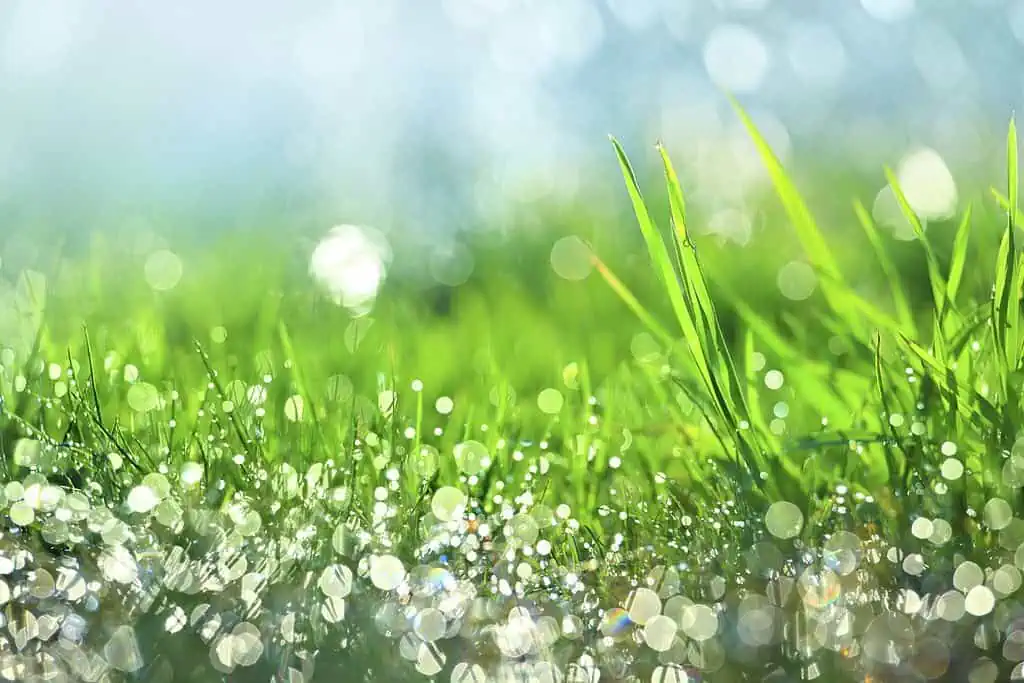Humans are not the only living things affected by sunlight or the heat from the bright yellow sun in the sky. Plants like grass, flowers, and trees also share experiences in every weather condition. That includes times when you have to water the plants by yourself. So does watering your grass in the sunburn it?
When the summer heat starts, many homeowners and gardeners watering their lawns always wonder about the shining sun. You can put that down to the theory behind it.
According to the theory, water droplets act as magnifying glasses, focusing the sun’s energy and supposedly burning the blades of grass underneath. Whether true or not, this article will separate facts from fiction. Read on!
Will Watering Your Grass in the Sun Burn It?
Many factors affect grass’s health, so it’s difficult to tell what causes grass to wilt and lose its natural green shade. That is mostly the case during summer when heat presents many challenges. As a result, many homeowners and gardeners believe that watering grass at noon or during the midday sun will burn the blades.
They believe the water droplets accumulating on the leaves act as magnifying glasses, concentrating the sun’s heat on them. However, this is not true. The theory has been proven to be false and inaccurate. No matter the time of the way, you can water your grass, including on hot, intense days.

The hot weather and the water will not cause the grass to burn. Additionally, the water droplets on the leaves and grass blades cannot focus the sun’s energy to damaging levels. If your lawn exhibits signs of water stress in the midday sun, experts even recommend watering it immediately, as postponing watering can hurt the sod.
Generally, grass burns are caused by agents of water, not the water itself. Some agents like chlorine and salt are the main culprits.
The Best Time to Water Your Grass
No particular time of the day is tagged as the best to water your grass. However, watering your lawn when the sun is at its hottest is a bad idea, so do your best to avoid it. While watering when the sun is shining helps to reduce heat stress and cools the plant temperature, water still gets lost through evaporation.
Generally, many homeowners and experts agree that the best time of the day to water grass is in the early morning. This time is perfect for your grass before it gets too hot.
Even though some locations are hotter than others, you should water your grass at least before 10 am. Mornings are generally good, with water penetrating the soil to the grass’s root. That gives the lawn enough water to thrive and look healthy all day.
Early morning, much water gets deep below the surface, effectively reducing evaporation when the sun pops up. However, you might forget to water your lawn or have issues doing so in the morning. If that’s the case, you can water the lawn late afternoon, around 3 pm and 4 pm. Watering is an invitation to fungal development when it gets past this time.
Take Some Precautions

You can water your grass under the hot sun, but you’d better observe some precautions, including the following:
- If your lawn is suffering from heat during the day, water it immediately. Don’t let the sun vent you from watering a thirsty lawn.
- If you fail to water early in the morning and at noon, the evening or night is not your best option. You’d better leave it for the next day. Besides encouraging fungal development, watering your lawn close to nightfall or at night can leave the grass unhealthy. Other potentially harmful organisms attracted to water and darkness will disturb your lawn.
- Always take note of the kind of grass you have planted. Different species have different water needs. This will help you do the right thing and water accordingly.
Things That May Cause Grass Burns
Grass can survive for days to weeks without water. However, the grass begins to turn yellow, which often means that water is the remedy to this problem. If your lawn appears burnt while watering it in the sun, here are possible reasons why:
Too Much Fertilizer
Fertilizers go a long way, but over-fertilizing can lead to burns on your lawn. In such a scenario, you cannot blame watering in the sun. Excess fertilizer often combines with other elements in the solid to affect the conditions your lawn needs to thrive.
Buildup of Salt
Under-irrigating your lawn in the summer can lead to salt buildup since much water evaporates into thin air. Also, watering with salt water can cause salt to accumulate. That will most likely cause your grass to start dying off.
Grass Pollutants
Pollutants like chlorine (especially in excess quantity) can drastically lower soil quality. When this happens, the health of your grass is compromised.
Drought Conditions
In extreme drought conditions, grass will turn yellow in patches, and drying all over the lawn may occur. You can ensure that your grass gets enough water through irrigation.
Conclusion
No, watering the grass in the sun does not burn the grass. This myth has existed for a long time, but this article and other information show it is false. You can water on a sunny day without worrying about your grass getting burn marks and patches.
Now that you know this, don’t worry about water droplets causing excessive heat on your grass blades. Other reasons for your grass burning are drought, pollutants, and over-fertilizing.






